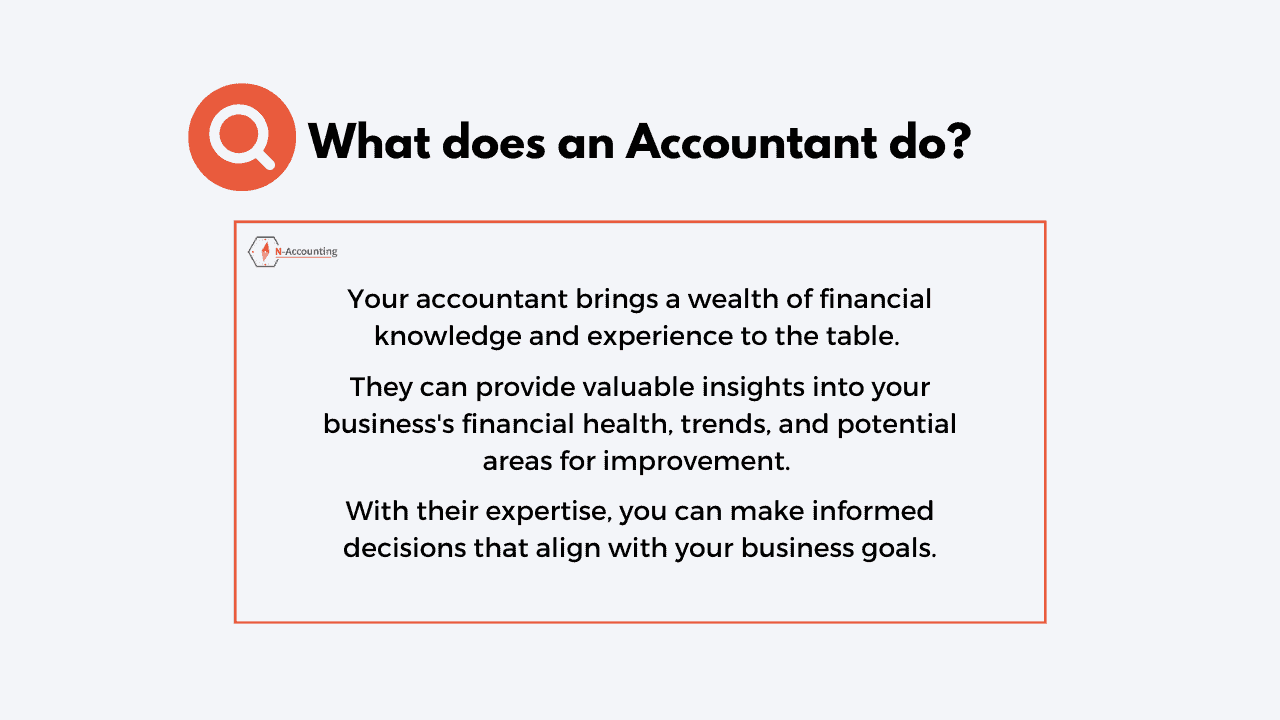You don’t need to do it all by yourself. Running a small business comes with its fair share of financial challenges. One of the key players in your success story is your accountant. From managing finances to provide valuable insights, your accountant can be your secret weapon for taking your small business to new heights.
In this blog post, we’ll explore how you can lean on your accountant to effectively leverage their expertise to ensure the financial health and growth of your small business.

Finding the right accountant for your small business
First off, we need to talk about how to narrow down the right candidates for your small business. Finding a reliable accountant is absolutely crucial for the financial health and long term success of your own firm. Some steps to help you identify the right accountant for you:

Determine your needs
Before you start your search, clarify exactly what you need from an accountant. It’s easy to say yes to every service when that may not actually benefit your small business in the long term. Do you need help with bookkeeping, tax preparation, financial planning, tax returns or a combination of services? Understanding your specific needs will help you find an accountant with the appropriate experience.
Seek Referrals
Ask other business owners, friends, family members, or professional networks for recommendations. How have other people found their services to be? Personal referrals are the best and often provide valuable insights into an accountant’s reliability, professionalism, and capabilities.
Check their Qualifications
Do they meet the requirements of an accountant? How much knowledge do they have in their industry? Look for certifications such as Certified Public Accountant (CPA) or Chartered Accountant (CA) depending on your location. These designations indicate that the accountant has met specific education and accounting requirements.
Do Your Research
Search online for accountants in your area who specialise in small businesses. Review their websites, read client testimonials, and identify areas of expertise. Look for any big red flags or negative reviews.
Interview
Narrow down your list to a few potential accountants and schedule interviews or consultations. Prepare a list of questions to ask about their experience, services, fees, and approach to working with small businesses.
Assess Communication
During the interview, evaluate how well the accountant listens to your concerns and whether they explain the complexities of financial concepts in a clear way that makes sense to you. This is important as, going forward, you want to ensure that your regular communication with them is not hindered in any way.
Discuss Fees
Be transparent about the budget for your small business and discuss your accountant’s fee structure. Some accountants charge hourly rates, while others may offer package deals. Make sure you understand the cost of their services upfront.
Consider Industry Experience
If your business operates in a specific industry or has different financial needs, look for an accountant with experience in that field. Industry-specific knowledge can be a valuable asset and will be more beneficial for you in the long run.
Evaluate Compatibility
Finding a reliable accountant also involves assessing your compatibility. You’ll be working closely with this individual, so ensure your personalities and working styles complement each other.
Trust Your Instincts
Above all, trust your instincts. If something doesn’t feel or sit right with you trust those doubts. Whether it be about the credibility of their services or about an accountant’s reliability, it’s okay to continue your search.

How Your Accountant Can Propel Your Small Business Forward
Now that you’ve found your small business accountant, you are ready to leverage this professional to your advantage. Your accountant will help you set achievable financial goals, allocate resources wisely, and adjust your plans based on financial projections and market trends. Your accountant should be well-versed in tax laws and regulations. They can help you with legal strategic advice to minimize your *tax liabilities, identify growth opportunities and potentially saving your business significant amounts of money. This extra capital can then be reinvested into your business for growth.
Financial management
As a small business owner, your accountant can help you outline your business’s cash flow management through your balance sheets, liabilities, and equity. Understanding this snapshot of your financial performance is crucial for making strategic decisions and seeking financing.
Think of financial statements as the heartbeat of your business with your accountant serving as the translator. Balance sheets reveal your company’s assets, liabilities, and equity, offering a snapshot of your business’s financial health. An income statement dissects revenue and expenses, ultimately showcasing your profits or losses.
Teaming with your accountant to break down these statements gives you a comprehensive understanding of your business’s financial position. Moreover, they assist in managing cash flow, ensuring that your small business maintains liquidity even through the challenging times.

Collaborating with your accountant
Successful small businesses are guided by financial planning. Your accountant plays a crucial role in creating a budget that aligns with your objectives. The financial analysis of data and predicting future trends, give accurate financial forecasts that empower you to make informed decisions. Additionally, they help identify potential areas for investment and expansion, evaluating the feasibility and potential returns of these opportunities. Their expertise aids in assessing risk and reward, fostering a balanced and strategic approach to financial management.
Do you budget correctly? As your small business grows, a well-constructed budget becomes a game changer for decision-making. If not, your accountant can completely assist you in creating detailed budgets that allocate resources to various departments and projects, ensuring that every pound is optimized for maximum impact.
By collaborating closely with your accountant in budget planning, you gain the ability to proactively manage cash flow, allocate resources efficiently, and seize opportunities that align with your business goals.
Navigating Risk Management
Staying compliant with ever-changing regulations is a challenge for any business owner. Great accountants are well informed in the knowledge of financial processes and regulations – ensuring your business operates within legal frameworks. Their guidance minimizes the risk of fines, penalties, and reputational damage.
Moreover, the right accountant will help you navigate financial decisions by conducting thorough risk assessments and developing mitigation strategies. This collaborative effort safeguards your business’s financial well-being and allows you to focus on core operations.

Strategic Tax Planning
Tax planning for small businesses goes beyond annual filings; it’s a year-round endeavour. Your accountant is your partner in developing tax-smart strategies that reduce liabilities while optimizing benefits. By staying updated on tax code changes and identifying applicable credits and incentives, they help you retain more of your hard-earned revenue. Their insights will help you to plan for the future, preparing your business for potential tax shifts and ensuring long-term financial stability.
Leveraging Your Accountant’s Insights
Measuring business success goes beyond profitability. Key Performance Indicators (KPIs) provide a comprehensive view of your business’s health. Your accountant assists in defining and tracking relevant KPIs, offering insights into areas of strength and opportunities for improvement. By evaluating business efficiency metrics, you can fine-tune operations and enhance productivity. Furthermore, their analysis guides strategic pivots, ensuring your business remains adaptable and aligned with your goals.

Making Big Moves with Your Accountant’s Support
Expanding, merging, or planning an exit strategy demands close analysis of your financial data. Your accountant plays a pivotal role in these critical business decisions. They help assess the financial feasibility of growth initiatives, providing projections and scenarios to help you make informed business decisions.
When it comes to mergers and acquisitions, their know-how makes sure all the important details are checked and helps with the bargaining process. When planning an exit, your accountant aids in maximizing the value of your business and orchestrating a seamless transition. Their insights are instrumental in making these significant moves with confidence.
In the world of small business owners, your accountant is more than a number-crunching professional; they are a strategic ally. By tapping into their expertise, you unlock a treasure trove of financial analysis that guide your business towards success. From financial statements to compliance, planning your taxes, and growth strategies, your accountant’s role is pivotal in ensuring sustainable growth, informed decisions, cash flow management and a thriving entrepreneurial journey. Embrace the collaborative power of your accountant, and watch your small business flourish beyond expectations.














